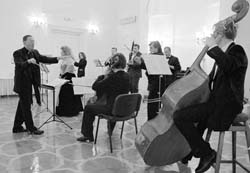The Russian embassy in Kyiv held a rather unusual music soiree, presenting a new cycle dedicated to outstanding Slavic cultural figures

The first concert was dedicated to the famous Russian composer Igor Stravinsky, whose 120th jubilee had been celebrated across the world this year. His talent was extremely diversified. In fact, his family roots are traced to Volyn and Kyiv. His father was an excellent singer, a very good painter, and had a gorgeous bass. He was considered a predecessor of FСdor Chaliapin. He sang with the Kyiv Opera for several years, then became a soloist with the Mariynsky Theater [in St. Petersburg]. FСdor Stravinsky was gifted in a number of ways. His vocal repertoire included a lot of Ukrainian folk songs. Repin, painting his Cossacks, had him pose as the sullen Cossack captain. Stravinsky, Sr. instilled in his son his love of the “singing land” as he called Ukraine. The composer’s memorial museum in Ustyluha (the place of the Stravinskys’ family estate) has unique items on display, including the musical scores of Petrushka and The Rite of Spring which the composer wrote almost entirely at that place. Music critic Olena Diachkova, acting as emcee that evening at the embassy, told this and other interesting things. The program included miniature music pieces that could be described as Stravinsky’s aphorisms, each a coded message containing his ideas. During a small concert, the Kiev Kamerata orchestra performed works reflecting different stages in the composer’s creative life (e.g., Monastery Spring to Horodetsky’s lyrics, written in 1908, in a way foretold The Rite of Spring, with the religious theme going back to heathen Rus’). The audience heard different Stravinskys: “Jokes” for voice and eight instruments, representing the Russian period, whereas The Soldier’s Tale and Apollon musagete are obviously foreign.
Kyiv Kamerata’s artistic director Valery Matiukhyn said the musicians were free to choose the program of the soiree, but they had a tight timeframe. The ambassadors present could not be late for the audience with Premier Viktor Yanukovych, so only one- fourth of the program was actually fulfilled.
After the concert, Russian Ambassador Viktor Chernomyrdin stressed:
“We will hold such soirees on a regular basis, familiarizing our guests with the great masters who made a special contribution in our culture. We won’t date them to particular anniversaries and jubilees, but we’ll certainly feature noted personalities that glorified both Russia and Ukraine. I would like to thank the Kyiv Kamerata and the singer Liudmyla Voinarovska for their splendid renditions of Igor Stravinsky, for the excellent evening enjoyed by all those present. Regrettably, our concert hall is too small and we couldn’t invite more guests. Judging by the audience’s warm response our initiative is getting to be popular. Perhaps we’ll all also invite Russian performers.”
Among the guests were politicians, diplomats, scientists, representatives of volunteer organizations, and cultural figures.
“Today, we listen to his compositions other than people did a hundred years ago. At present, Igor Stravinsky is a classic of world culture, a man of the world. This concert marks a significant event,” said Mykhailo Stepanenko, Chairman of the Composers Union of Ukraine. “His 120th jubilee is a very special date and UNESCO proclaimed 2002 the Year of Stravinsky. The Year of Ukraine is nearing completion in Russia. We will soon celebrate the Year of Russia in Ukraine. This soiree could be described as a small rehearsal of the coming festivities.
“Igor Stravinsky is a part of Russian as much as of Ukrainian culture. Not so long ago, we studied archival documents dealing with the Stravinskys together with Ihor Blazhkov, a noted conductor who knew Igor Stravinsky personally and corresponded with him. We discovered that one of the composer’s ancestors had been Mayor of Kyiv in 1597. FСdor and Igor Stravinsky’s creative endeavors were closely associated with Ukraine. Igor wrote that there was Ukrainian blood in his veins and that he was proud of it. He wrote several compositions at his father-in-law’s estate in Ustyluha. We want to attach a memorial plaque to the house where the Nosenkos lived in Kyiv (at 28 Liuteranska St.). “During this concert we heard Stravinsky’s classic pieces, 18th c. reminiscence in the suite from the ballet Pulcinella. His love of fundamental Russian music, as evidenced by the Jokes so skillfully performed by Liudmyla Voinarovska. Valery Matiukhyn’s Kyiv Kamerata showed small movements from the composer’s works and they succeeded in creating a chamber, friendly and somewhat nostalgic atmosphere at the soiree. The kind of music we heard inspires elevated feelings, uniting peoples and countries.”
The Russian initiative of music soirees was most enthusiastically supported by Volodymyr Syrenko, artistic director and conductor of the National Symphony Orchestra of Ukraine. “The more music the better,” he declared. “There are so many personalities we must never forget. Stravinsky is a composer of the world. It is good that his recent jubilee served as yet another opportunity to remember the maestro.”
According to the cycle organizer, such soirees at the Russian embassy will be held once every three months. He also let this author in on a little secret: the next one will commemorate the great bass FСdor Chaliapin.






